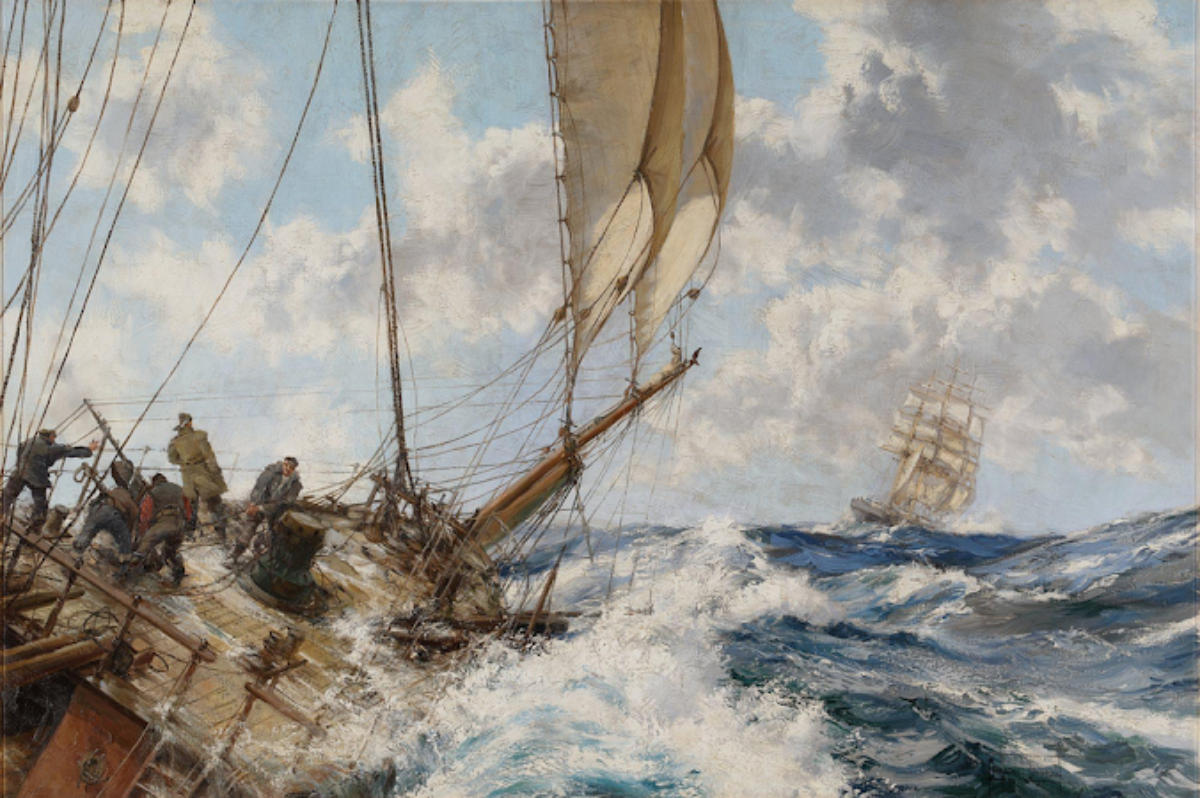The tide is full, the moon lies fair
Upon the straits; on the French coast the light
Gleams and is gone; the cliffs of England stand;
Glimmering and vast, out in the tranquil bay.
Come to the window, sweet is the night-air!
Only, from the long line of spray
Where the sea meets the moon-blanched land,
Listen! you hear the grating roar
Of pebbles which the waves draw back, and fling,
At their return, up the high strand,
Begin, and cease, and then again begin,
With tremulous cadence slow, and bring
The eternal note of sadness in.
Heard it on the A gaean, and it brought
Into his mind the turbid ebb and flow
Of human misery; we
Find also in the sound a thought,
Hearing it by this distant northern sea.
Was once, too, at the full, and round earth’s shore
Lay like the folds of a bright girdle furled.
But now I only hear
Its melancholy, long, withdrawing roar,
Retreating, to the breath
Of the night-wind, down the vast edges drear
And naked shingles of the world.
To one another! for the world, which seems
To lie before us like a land of dreams,
So various, so beautiful, so new,
Hath really neither joy, nor love, nor light,
Nor certitude, nor peace, nor help for pain;
And we are here as on a darkling plain
Swept with confused alarms of struggle and flight,
Where ignorant armies clash by night.
How does intuition relate to transcendence?
Faith must be freely chosen.
If God can’t be parsed from the whole of the Real there can be no transcendence except in the sense that arriving where you started you know the place for the first time.
The world of things is available to us through our senses alone yet there is a transcendent aspect of “things-in-themselves”. But it is not a separate realm. What is perceived in phenomenal reality is not entirely factual. “Plato himself esteemed beauty as the particular form of value that actually can be seen in things. To make this consistent with the rest of his theory, however, he had to say that beautiful objects were only “shadows” of the higher reality, “participating” in the Form of Beauty. Although Kant’s own aesthetics were subjectivist …., his metaphysics could allow for a more literal rendering of Plato’s own claim about beauty: Since transcendence is in phenomenal objects, the beauty that we see in things is in fact a perception right through factual reality to Beauty Itself.” (Kelly Ross)
Now, turn that a little further and you might get: Since transcendence is in phenomenal objects, the sacred that we see in things is in fact a perception right through factual reality to the Divine itself.
Intuition is this “perception right through factual reality” and as such is the faculty of transcendence, such as it is. Arriving where you began and knowing the place for the first time is thus explained. It is a real transcendence without the baggage of requiring a separate realm or level of reality. Faith is active intuition. When freely selected it can blossom into a full mode of existence, a way of life, a path to everlasting transcendence; a dwelling in the numinous. It is nothing short of a prolonged and everlasting Noesis. The only way you have faith is if you choose faith. It is the very essence of the affirmation of the Real. Faith and intuition are evidence of things unseen. They are inclusive; they are constant affirmation continuing across the entire spectrum of experience. In a sense they are the opposite of Science as a mode of being in the world which demands of the Real convincing proofs before the suspension of doubt.
False and fanciful notions of transcendence whether as a project of History, as in cultural Marxism, or, similarly, exoteric Religion, secular or otherwise, with its idea of a separate and perfect realm called Heaven, or Nirvana, or a perfect state of cultural utopia however defined by the social justice warriors, denizens of the Cult of Modern Liberalism, are root causes of a discarnate longing, insensate and boundless, a force of nature, a passion to finally arrive at a state of completion always just the other side of every day reality. The reason people are so miserable is they insist on making the world conform to their notion of transcendence. They say they have the answer to life’s problems and intend to force their ideas on everyone else – because they, unlike the rest of us, really do own the truth, have a direct path to the one true source, “God”, whether it is religious or secular. So, until everyone thinks “right thoughts” we will be mired in misery and it is their mission to make certain this misery is shared equally. The Progressive of the Cult hurries in a perpetual vanishing and has no reflexivity. He is discarnate longing for his Utopian dreams, wholly owned by the daemonic. This evil is the state of being insatiable, forever seeking fulfillment in an ever receding underivable future condition.
You can thank Christianity and its offshoots for this. As a force of nature, the boundless, insensate and discarnate passion, longing, to finally own completion in a final act of transcendence is Christianity’s gift to the world. Christianity posited the daemonic spirit in the world and is responsible for the modern malaise wherein western man has evolved into a spiritless self, a self filled with despair and self-loathing, utterly lost and confused and yet increasingly certain that they alone have the prescription for society’s ills. They are the “insensate prison of an alien and restless power in quest of a ‘hidden’ divinity” or surrogate thereof. (William Poteat)
